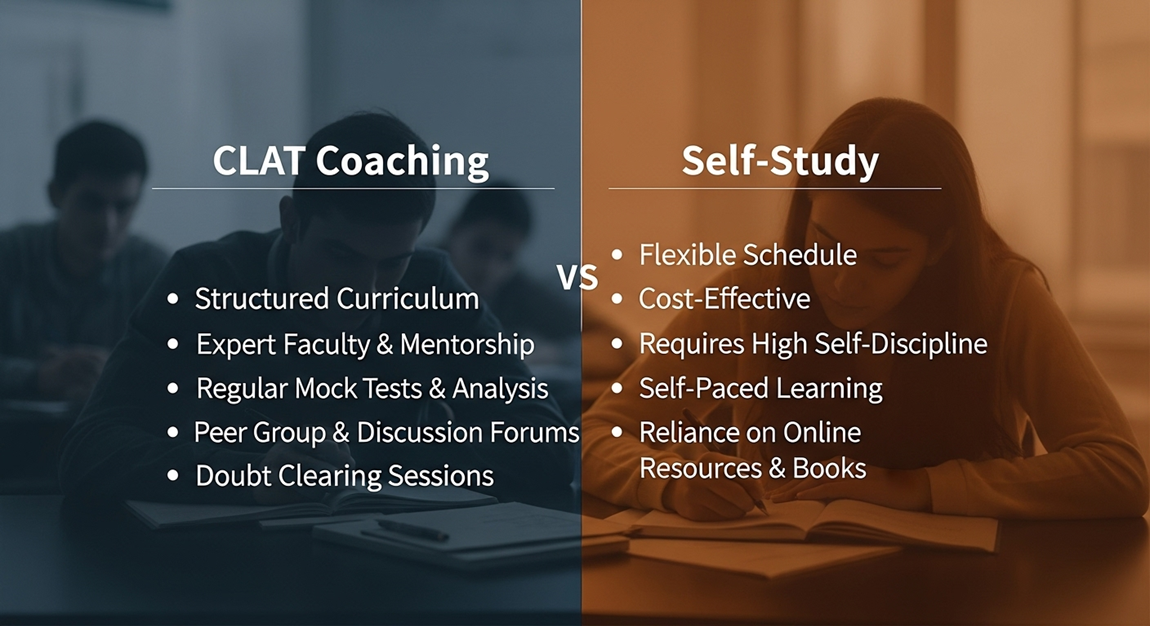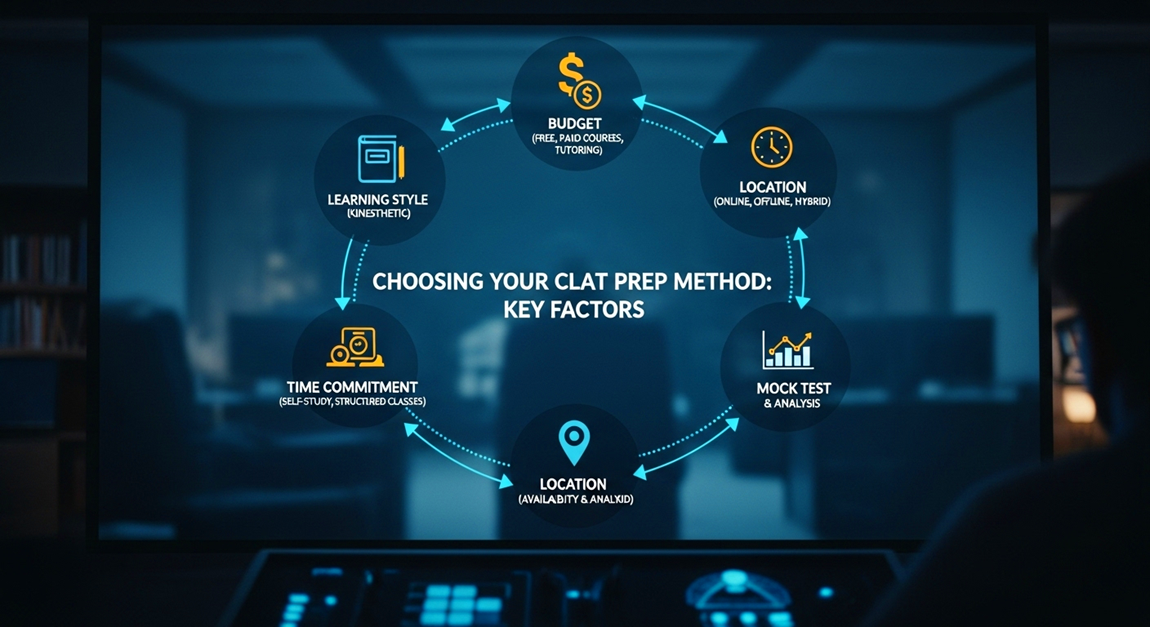Choosing the Right CLAT Coaching Path
When it comes to preparing for the Common Law Admission Test (CLAT), selecting the right coaching strategy is crucial. With various options available, aspiring law students often find themselves at a crossroads between online and offline coaching. Each method has its unique advantages and challenges, making it essential to evaluate them carefully to determine which aligns best with your learning style and goals.
The Importance of Choosing the Right CLAT Preparation Strategy
Choosing the right CLAT preparation strategy can significantly impact your performance on the exam. A well-structured coaching program can provide you with the necessary resources, guidance, and support to navigate the complexities of the syllabus. Whether you prefer the flexibility of online classes or the traditional classroom experience, understanding your personal learning preferences is key. A tailored approach can help you stay motivated and focused, ultimately leading to better results.
Overview of Online and Offline CLAT Coaching Options
Online CLAT coaching has gained popularity due to its convenience and accessibility. Students can attend classes from the comfort of their homes, allowing for a flexible schedule that can accommodate other commitments. Many online platforms offer a variety of resources, including recorded lectures, practice tests, and interactive forums for doubt clearance. This format is particularly beneficial for those who thrive in a self-paced learning environment.
On the other hand, offline coaching provides a structured classroom setting that can foster direct interaction with instructors and peers. This traditional approach often includes face-to-face discussions, group activities, and immediate feedback, which can enhance understanding and retention of complex concepts. For students who prefer a more hands-on approach and the motivation that comes from being in a physical classroom, offline coaching may be the better choice.
Setting the Stage for a Comprehensive Comparison
As we delve deeper into the comparison between online and offline CLAT coaching, it is essential to consider various factors such as cost, accessibility, teaching methods, and personal learning styles. Each option presents distinct benefits and potential drawbacks, making it vital to weigh these aspects carefully. By examining these elements, students can make an informed decision that aligns with their individual needs and aspirations.
CLAT Coaching Comparison
Online CLAT Coaching: Flexibility and Accessibility
As aspiring law students gear up for the Common Law Admission Test (CLAT), the choice between online and offline coaching has become a significant consideration. Online CLAT coaching offers a unique blend of convenience, affordability, and flexibility, making it an attractive option for many students. In this section, we will explore the benefits of online coaching, highlight some top platforms, and address potential drawbacks.
Benefits of Online CLAT Coaching
One of the primary advantages of online CLAT coaching is its convenience. Students can access classes from the comfort of their homes, eliminating the need for travel and allowing them to study at their own pace. This flexibility is particularly beneficial for those balancing other commitments, such as part-time jobs or family responsibilities. Additionally, online coaching often comes at a lower cost compared to traditional offline classes, making it a more affordable option for many.
Top Online CLAT Coaching Platforms and Their Features
Several online platforms have emerged as leaders in CLAT coaching, each offering unique features to cater to different learning styles. For instance, platforms likeCLAT Possibleprovide comprehensive study materials, live classes, and recorded sessions, allowing students to revisit complex topics.Unacademyoffers a vast array of courses with expert educators, interactive quizzes, and a community for peer support.Career Launcherfocuses on personalized mentorship and tailored study plans, ensuring that students receive guidance suited to their individual needs.
Addressing Potential Drawbacks
While online CLAT coaching has many benefits, it is essential to consider some potential drawbacks. One significant concern is the lack of personal interaction with instructors and peers, which can hinder collaborative learning and immediate feedback. Additionally, students may face challenges with self-discipline, as the flexibility of online classes requires a strong commitment to stay on track. To mitigate these issues, students can set a structured study schedule and engage in online forums to foster a sense of community.

Online CLAT Coaching
Offline CLAT Coaching: Structured Learning and Mentorship
When it comes to preparing for the CLAT exam, choosing the right coaching method is crucial. Offline CLAT coaching offers a structured learning environment that can significantly benefit students. This section delves into the advantages of offline coaching, the reputable institutes available, and some considerations to keep in mind.
Advantages of Offline CLAT Coaching
One of the primary benefits of offline CLAT coaching is the structured environment it provides. Students can follow a well-defined curriculum that covers all necessary topics systematically. This structure helps in maintaining a consistent study schedule, which is essential for effective preparation.
Additionally, offline coaching allows for personalized attention from instructors. With smaller class sizes, students can receive tailored guidance and feedback, addressing their specific strengths and weaknesses. Lawgic is one such option that provides this level of individualized instruction. This one-on-one interaction can be invaluable in clarifying doubts and enhancing understanding.
Peer interaction is another significant advantage. Being in a classroom setting fosters collaboration and discussion among students, which can lead to a deeper understanding of concepts. Group studies and peer learning can motivate students and create a supportive learning community.
Reputable Offline CLAT Coaching Institutes and Their Teaching Methodologies
Several reputable offline coaching institutes have established themselves as leaders in CLAT preparation. These institutes often employ experienced faculty members who are well-versed in the exam pattern and syllabus. Their teaching methodologies typically include a mix of lectures, interactive sessions, and mock tests, ensuring comprehensive coverage of the syllabus.
Institutes like CLAT Possible and Career Launcher are known for their rigorous training programs. They focus on developing critical thinking and analytical skills, which are essential for success in the CLAT exam. Regular assessments and feedback help students track their progress and make necessary adjustments to their study plans.
Considerations: Cost, Location Constraints, and Less Flexibility
While offline coaching has its advantages, there are some considerations to keep in mind. The cost of offline coaching can be significantly higher than online alternatives, which may not be feasible for all students. Additionally, location constraints can limit access to quality coaching institutes, especially for those living in remote areas.
Another factor is the less flexibility in scheduling. Offline classes, such as those offered by Lawgic, are typically held at fixed times, which may not suit everyone’s personal commitments. Students need to weigh these factors against the benefits of structured learning and mentorship when deciding on their CLAT preparation strategy.

Offline CLAT Coaching
CLAT Coaching vs. Self-Study: A Detailed Comparison
Preparing for the Common Law Admission Test (CLAT) can be a daunting task, and students often find themselves at a crossroads when deciding between structured coaching and self-study. Each approach has its own set of advantages and challenges, making it essential to analyze both methods to determine which suits individual learning styles and resources best.
Analyzing the Pros and Cons of Self-Study for CLAT Preparation
Self-study offers flexibility, allowing students to create their own schedules and study at their own pace. This method can be particularly beneficial for those who are self-motivated and disciplined. However, the lack of guidance can lead to gaps in knowledge, as students may not be aware of the most effective study materials or strategies. Additionally, without a structured environment, some may find it challenging to stay focused and committed to their study plan.
Comparing the Effectiveness of Self-Study Versus Structured Coaching
Structured coaching provides a comprehensive curriculum designed specifically for CLAT preparation. Coaches often have experience and insights that can help students navigate the complexities of the exam. Moreover, coaching centers typically offer mock tests and feedback, which can be invaluable for assessing progress. On the other hand, self-study may allow for a more personalized approach, where students can focus on their weaknesses without adhering to a fixed syllabus. Ultimately, the effectiveness of either method depends on the individual’s learning style and commitment level.
Identifying Ideal Candidates for Each Approach Based on Learning Styles and Resources
Students who thrive in a structured environment and benefit from direct interaction with instructors may find coaching to be the ideal choice. This is especially true for those who may struggle with self-discipline or require motivation from peers. Conversely, self-study may be more suitable for independent learners who are comfortable managing their own time and resources. Those with limited access to coaching centers or financial constraints may also prefer self-study as a viable alternative.

CLAT Coaching Comparison
Cost Analysis: Budgeting for CLAT Preparation
Preparing for the CLAT exam can be a significant financial commitment, whether you choose online or offline coaching. Understanding the costs involved is crucial for effective budgeting. This section will break down the expenses associated with both coaching methods, explore cost-effective alternatives for self-study, and provide tips for maximizing your budget.
A Breakdown of the Costs Associated with Online and Offline CLAT Coaching
When considering CLAT coaching, the first step is to evaluate the costs. Offline coaching typically involves tuition fees, which can range from INR 20,000 to INR 50,000 or more, depending on the institute’s reputation and location. Additionally, students may incur travel expenses and costs for study materials. On the other hand, online coaching often presents a more affordable option, with fees ranging from INR 10,000 to INR 30,000. However, students should also consider the cost of a reliable internet connection and any necessary devices.
Exploring Cost-Effective Alternatives and Resources for Self-Study
For those looking to save money, self-study can be a viable alternative. Numerous free and low-cost resources are available online, including video lectures, e-books, and practice tests. Websites like YouTube and educational platforms offer valuable content that can aid in CLAT preparation without the hefty price tag. Additionally, joining study groups or forums can provide support and motivation while sharing resources and tips among peers.
Tips for Maximizing Your Budget and Getting the Most Value for Your Money
To make the most of your budget, consider the following tips: First, research and compare different coaching options to find the best fit for your needs and budget. Look for trial classes or free resources to gauge the quality of the coaching before committing. Second, create a study schedule that allows you to balance your time effectively between coaching and self-study. Lastly, keep track of your expenses and adjust your budget as needed to ensure you are investing wisely in your CLAT preparation.

Cost Analysis for CLAT Preparation
Success Stories and Testimonials: Real-Life Experiences
When it comes to preparing for the CLAT, the journey can be as unique as the individuals embarking on it. Many students have shared their success stories, highlighting how different preparation methods have played a crucial role in their achievements. In this section, we will explore these real-life experiences, focusing on testimonials from students who have utilized both online and offline coaching, and emphasizing the importance of personal dedication in their journeys.
Success Stories of Students Excelling with Various Preparation Methods
Across the spectrum of CLAT coaching, students have found success through diverse methods. For instance, Priya, a student from Delhi, opted for offline coaching at a local institute. She appreciated the structured environment and face-to-face interactions with instructors, which helped clarify her doubts immediately. Priya’s disciplined routine and the motivation from her peers contributed significantly to her success in the exam.
On the other hand, Rohan, who chose online coaching, found flexibility to be his greatest ally. He could study at his own pace, revisiting complex topics whenever necessary. Rohan’s commitment to his study schedule, combined with the resources available online, allowed him to excel in the CLAT. Both Priya and Rohan’s stories illustrate that success can be achieved through different avenues, provided there is a strong personal commitment to the preparation process.
Testimonials from Students Using Both Online and Offline Coaching
Many students have shared their experiences with both online and offline coaching, providing valuable insights into their effectiveness. Anjali, who initially enrolled in offline classes, later transitioned to online coaching due to her busy schedule. She noted that the online platform offered her a wealth of resources, including recorded lectures and practice tests, which she could access anytime. This adaptability allowed her to balance her studies with other commitments, ultimately leading to her success in the CLAT.
Conversely, Vikram, who started with online coaching, felt the need for more direct interaction and switched to offline classes. He found that the immediate feedback from instructors and the collaborative environment of a classroom setting significantly improved his understanding of the subjects. Vikram’s experience underscores the idea that the choice between online and offline coaching can depend on individual learning preferences and circumstances.
The Importance of Individual Effort and Dedication
Regardless of the chosen method, the common thread in all success stories is the individual effort and dedication of the students. Both Priya and Rohan, along with Anjali and Vikram, demonstrated that personal commitment is essential in achieving their goals. They all maintained a consistent study schedule, sought help when needed, and remained focused on their objectives.
Ultimately, whether one chooses online or offline coaching, the key to success in CLAT preparation lies in the student’s determination and hard work. The experiences shared by these students serve as a testament to the fact that with the right mindset and dedication, success is attainable in any format of coaching.

Success Stories and Testimonials
Choosing the Best CLAT Coaching Method for You
When it comes to preparing for the Common Law Admission Test (CLAT), selecting the right coaching method is crucial for success. With various options available, it can be overwhelming to determine which approach aligns best with your needs. This guide will help you navigate the decision-making process by considering key factors such as your learning style, budget, time constraints, and access to resources.
Understanding Your Learning Style
Your learning style plays a significant role in how you absorb information. Some students thrive in a traditional classroom setting, benefiting from face-to-face interactions with instructors and peers. Others may find that online learning suits them better, allowing for flexibility and self-paced study. Assessing whether you are a visual, auditory, or kinesthetic learner can help you choose a coaching method that resonates with your preferences.
Budget Considerations
Financial constraints are an important factor when selecting a CLAT coaching method. Online courses often come at a lower price point compared to offline coaching, which may include additional costs such as transportation and materials. Evaluate your budget and consider what you can afford without compromising the quality of your preparation. Remember, investing in a good coaching program can pay off in the long run.
Time Constraints
Time management is essential for effective CLAT preparation. If you have a busy schedule, online coaching may offer the flexibility you need to study at your own pace. On the other hand, if you prefer a structured environment, offline coaching can provide a set timetable that helps you stay accountable. Consider your daily commitments and how much time you can realistically dedicate to your studies.
Access to Resources
Access to study materials and resources can vary significantly between online and offline coaching. Online platforms often provide a wealth of digital resources, including recorded lectures, practice tests, and interactive forums. Conversely, offline coaching may offer personalized guidance and immediate feedback from instructors. Assess what resources are most important to you and how each method can meet those needs.
Exploring a Hybrid Approach
For some students, a hybrid approach that combines both online and offline elements may be the ideal solution. This method allows you to benefit from the flexibility of online learning while still receiving the personal touch of in-person coaching. By integrating both methods, you can tailor your study plan to suit your unique requirements, maximizing your chances of success in the CLAT.
Choosing the Best CLAT Coaching Method
Your Journey to CLAT Success
As you embark on your journey to conquer the CLAT exam, understanding the nuances of your preparation options is crucial. The choice between online and offline CLAT coaching can significantly impact your study experience and outcomes. In this section, we will recap the key advantages and disadvantages of both methods, emphasize the importance of dedication and strategic planning, and offer encouragement to all prospective candidates.
Recap of Coaching Options
When considering CLAT coaching, both online and offline formats present unique benefits and challenges. Online coaching offers flexibility, allowing students to learn at their own pace and access a wealth of resources from anywhere. This can be particularly advantageous for those balancing other commitments. However, the lack of face-to-face interaction may lead to feelings of isolation and less immediate feedback from instructors.
On the other hand, offline coaching provides a structured environment with direct access to teachers and peers. This can foster a sense of community and motivation, as students can engage in discussions and collaborative learning. However, it may come with limitations such as fixed schedules and geographical constraints, which can be challenging for some students.
The Importance of Dedication and Consistent Effort
Regardless of the coaching method you choose, dedication and consistent effort are paramount. The CLAT exam is competitive, and success requires a commitment to regular study and practice. Setting a study schedule, adhering to it, and actively engaging with the material will significantly enhance your preparation. Remember, it’s not just about the hours you put in, but the quality of your study sessions that counts.
Strategic Planning for Success
Strategic planning is another critical component of your CLAT preparation. Identify your strengths and weaknesses early on, and tailor your study plan accordingly. Utilize practice tests to gauge your progress and adjust your strategies as needed. Whether you opt for online or offline coaching, having a clear roadmap will help you stay focused and motivated throughout your journey.
Encouragement for Prospective CLAT Candidates
As you prepare for the CLAT exam, remember that every candidate’s journey is unique. Embrace the challenges and celebrate your progress along the way. With dedication, consistent effort, and a well-thought-out plan, you can achieve your goals. Whether you’re guided by the structured mentorship of Lawgic or exploring other resources, best wishes to all prospective candidates as you embark on this exciting journey!



